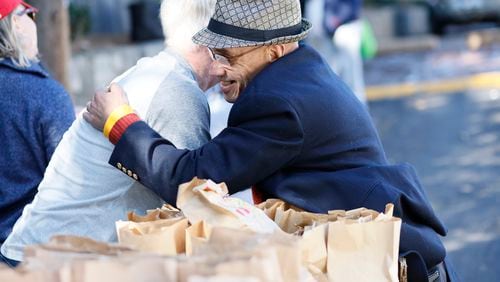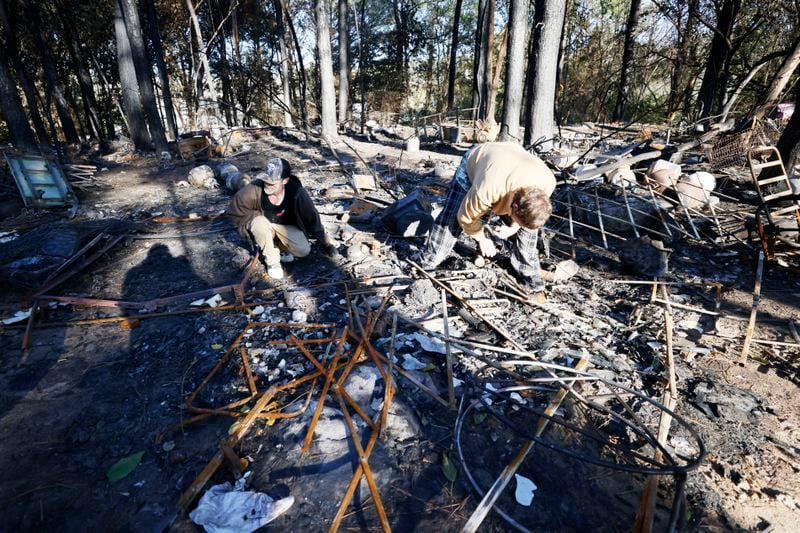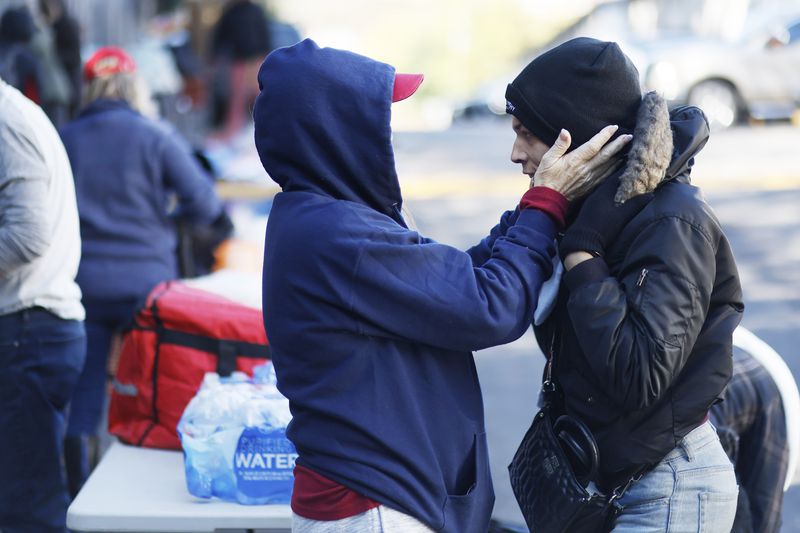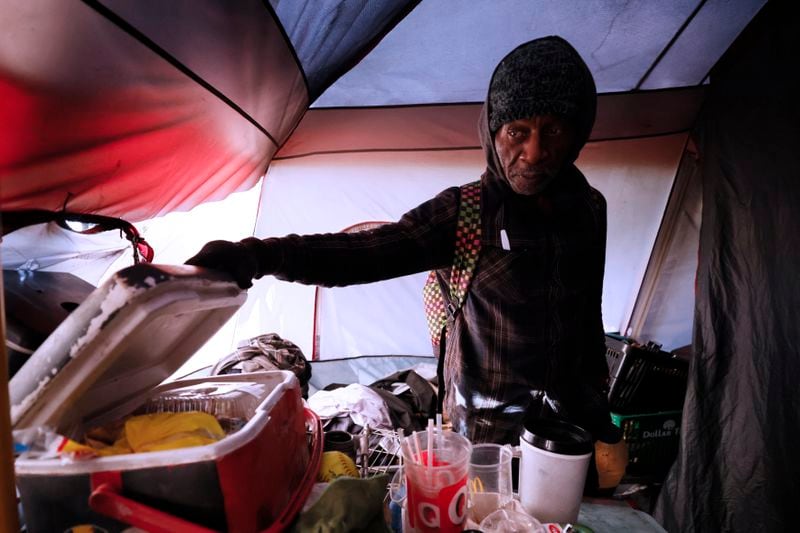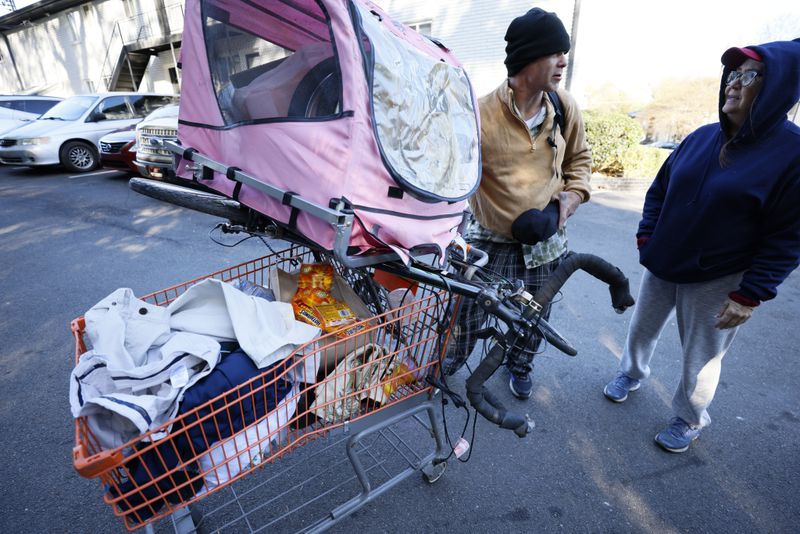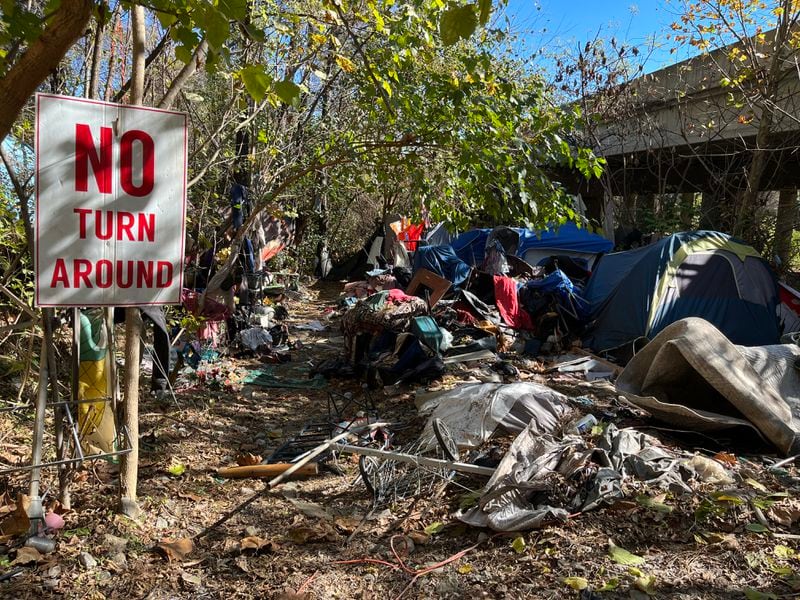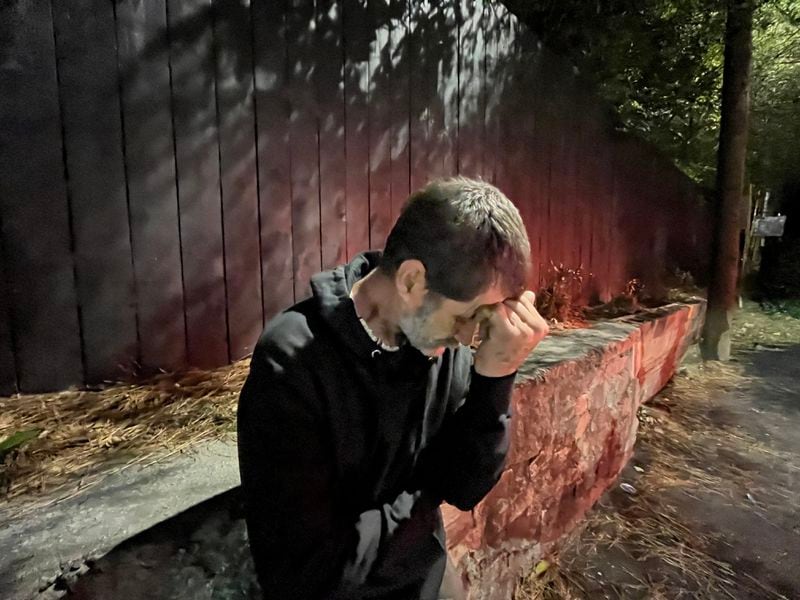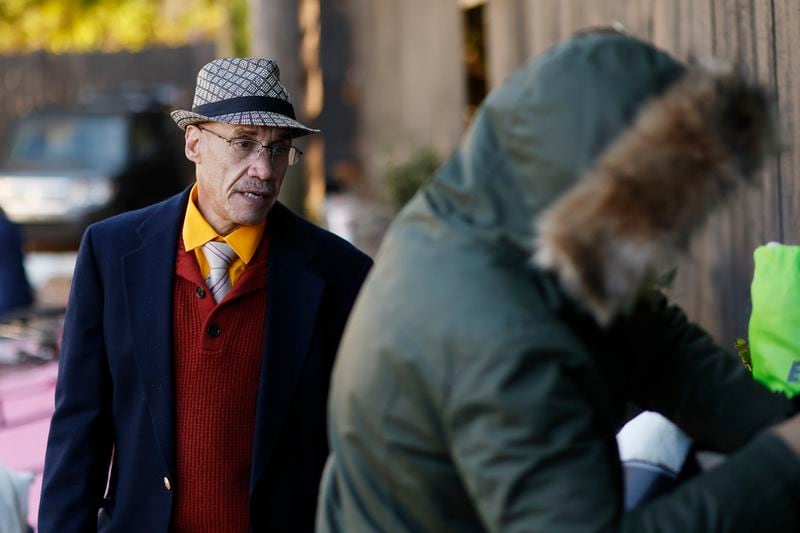The 64-year-old man, well dressed in donated clothes and a jaunty fedora, saw the fire coming.
He raced through a clearing to roust neighbors, he says, and then to the home he shared with his wife.
He grabbed what he could from inside the tent. A big plastic bag of their clothes. Two duffel bags. A case of water. He shuttled back and forth, dropping off what he saved farther from the encroaching brush fire.
A propane tank exploded. Its burst of heat smacked his back. He ran.
Later, he went to gather up the few items he had rescued. They were gone.
As the inferno raged, someone had taken even that little bit of what Santiago Murat had left.
Life already was fragile in one of metro Atlanta’s largest and perhaps most dangerous homeless communities.
The encampment endured drug dealers, government bulldozers, its own filth, rats, fights and hotheads with guns.
Yet “The Hill,” as it is known among residents, also was a neighborhood. Civilization and anarchy lived side by side. Some would steal, and some would share the little that they had. Some did both.
“It’s a hard life but we all love each other,” Murat says.
Then, on Nov. 9, with winter approaching, flames destroyed the shelters of many long-time residents.
The fire made the local news. Smoke wafted over I-85 and its interchange with Ga. 400. Commuter traffic was scrambled for hours, with Buford Highway closed in both directions at the base of The Hill, just south of Lenox Road.
A city nonprofit has given temporary shelter to many of the displaced. Others have melted back into nearby forests.
Credit: Miguel Martinez
Credit: Miguel Martinez
Life before the fire
There are different levels of homelessness in the nooks and crannies of Atlanta. Some have no tents. Some sleep on old mattresses without cover. Or benches in bus stop shelters.
For several years The Hill had spread, nearly invisible, in a small patch off woods on a rise squeezed between I-85 and Buford Highway. It clung just inside the outer edge of Buckhead, the city’s biggest wealthy enclave.
The people lived on Georgia Department of Transportation right of way, where camping is illegal. Heavy equipment was brought out about two years ago to tear down tents and shelters.
The people of The Hill came back.
Credit: Miguel Martinez
Credit: Miguel Martinez
More recently, a broader city of Atlanta housing initiative added The Hill to its list of priority encampments to “decommission,” in part because of its size, health and safety issues, and criminal activity, says Cathryn Vassall, chief executive of Partners for Home.
The city agency compiled a list of 27 named people living at the encampment, as well as several more nearby. Others estimate 100 or more slept under the trees and overpasses and along a creek in the surrounding area.
Many who chose The Hill sought a convenient spot that might offer safety in numbers, a chance to share precious resources and an antidote to isolation, say residents and homeless advocates.
“People don’t always understand the importance of community,” says Rudolph Earley, known as “Pops” to his neighbors.
There was at least one unofficial “mayor” who watched over a donated generator and advised newcomers where to set up tents after taking measure of where they might best get along. Another man, a big guy, was referred to by residents as “the enforcer” and would step in if there was trouble.
Not that life was easy.
During a recent tour of his tent, Earley showed a prized possession: A cooler, pulled from a trash heap, that kept his food — donated sack lunches and cupcakes — away from marauding rats.
On cold nights, the 68-year-old burned chunks of foam from seat cushions in a pan propped on a bucket inside his tent.
Credit: Miguel Martinez
Credit: Miguel Martinez
Some residents spoke of mental health problems, substance abuse and addictions, prison records and outstanding warrants. Others said they didn’t have such issues.
In the last year, residents say drug dealers began to set up outposts, erecting tents and recruiting lookouts. Complaints grew about violence and guns.
In April, under a nearby I-85 bridge, a man was shot and killed, according to a police report. In August, a homeless woman was shot nearby in the abdomen and taken to a hospital.
Nolan English, a homeless advocate with Traveling Grace Ministries, began carrying a holstered handgun when he visited The Hill.
Still, a steady stream of homeless people came and often stayed.
On an August night a young man, perhaps in his early 20s, looked out of sorts as he pushed a shopping cart along a sidewalk below The Hill. He was one of a small group in the surrounding area that are addicted to heroin, said a woman in her 50s named Charlie. “He struggles. He will sleep anywhere.”
Charlie, who moved to The Hill nearly three years ago, hadn’t had much dinner — one small chicken drumette that a neighbor offered her, and part of a donated cheese sandwich. But she handed the young man one of the two McChicken sandwiches a homeless advocate had given her minutes earlier. Soon, she gave the second one to another homeless person.
The mosquitos were voracious, and two other residents offered a visiting reporter some of their dwindling bug repellent. Outside another tent, a neighbor asked if he could have a T-shirt. Sure, said the tent owner, a man nicknamed Tattoo who had cooked pancakes for neighbors the night before.
Charlie said she is a former paralegal who used to have her own house. Then came the Great Recession and a lupus diagnosis that put her on disability, she said. She declined to share her name, saying she doesn’t want her children, who are grown up, to know where she had landed.
One night earlier in her stay on The Hill, two men fought violently. But early the next morning the two men rushed to help each other salvage belongings from their tents as a bulldozer rumbled in to flatten the camp. Charlie said the scene made her cry.
“We are part of a neighborhood,’’ she remembers saying to her husband, who lived on The Hill with her.
Credit: Miguel Martinez
Credit: Miguel Martinez
On this sweltering day in August, amid the mud and trash piles, her bright white pants had not a speck of dirt on them.
Residents said they regularly found clothes and other items left on the curbs of surrounding neighborhoods. The stuff thrown out in wealthy neighborhoods of Buckhead was one of The Hill’s draws.
Residents often relied on an outside spigot at an adjacent apartment complex for their water. When that luxury ended, they began trekking in five-gallon jugs from a local Publix.
Donated generators helped charge cell phones and two power cords tapped into electricity from a street light pole.
For a restroom, some used buckets with plastic bags in them, then dumped the bags in burn barrels they also used for trash. Others used shovels to bury human waste. Some didn’t bother.
There were no real locks on The Hill. Some erected hog wire fences or created makeshift barriers of debris, and others would team up to intervene when residents would steal things or harass women.
“We say, ‘Get out or we will be back in 30 minutes.’ We won’t kill them or nothing like that, but we’ll beat them up,” said Tattoo as he pieced together a bicycle with scrap parts in August.
His last bicycle was stolen and this one would probably be too, he predicted.
Tattoo said he was 50 years old and a former construction worker. He repeatedly declined to give his name, alluding to a family matter.
Credit: Matt Kempner
Credit: Matt Kempner
The fire and its aftermath
The large fire of Nov. 9 spread fast.
Ricaridia “Rick” Matthews, who some referred to as the unofficial mayor, said friends risked their lives attempting to save his belongings.
“That’s what’s amazing,” he said.
But much was lost to the flames.
As firefighters began leaving, Murat walked back to where his tent had been. He looked for photos he said he had on a small table: one each of his mother, grandmother and a brother.
Standing amid the charred remains, he wept.
“Oh, my gosh. Everything is melted,” he said.
Credit: Matt Kempner
Credit: Matt Kempner
Tattoo looked broken in the glow of the flashing lights of a firetruck.
“You build and you build and you build and you try to help,” he said. “It seems like every time something gets going good, something bad happens.”
How the brush fire began isn’t clear. The Atlanta Fire Department says the blaze is still under investigation.
Other fires, most of them small, have been reported on The Hill and in nearby areas where people who are homeless live or gather. But a fire under I-85 in 2017 caused a bridge to collapse. A more recent fire under Cheshire Bridge Road took out another bridge.
As evening arrived and temperatures dipped the evening of the fire, donors at the bottom of The Hill waited with supplies: fluffy blankets, tents, food, sleeping bags, first aid kits.
Temporary hotel stays had already been set up by Partners for Home, the city agency assigned to tackle homelessness.
And talk began immediately of speeding up plans for finally moving people off The Hill permanently, part of the agency’s broader plan to move 1,500 homeless people into housing by the end of 2024.
Four days after the fire, like every Sunday afternoon, donation tables were set up in a nearby parking lot. They were staffed by volunteers from the Elizabeth Foundation, a nonprofit launched by Tracy Thompson, who had been homeless herself years earlier near The Hill.
A few people were still on The Hill, including Earley, whose tent had survived. But with most people clearing out, he agreed to go to temporary housing at a hotel. He said it would be his first night sleeping indoors in two years.
A Hill resident who would only give his name as “Chattanooga” had mixed feelings.
Being on The Hill was “like a little slice of heaven, because we ruled ourselves,” he said. But “it’s a lot more stable” at the hotel. “You can have things, put things in your room and lock it,” he said. “We can prepare for tomorrow.”
Tattoo said he slept indoors for the first time in a year and a half.
“It was real nice. I had forgotten,” he said. But at night when he closes his eyes, he said he still thinks about life with his “family” on The Hill.
Credit: Miguel Martinez
Credit: Miguel Martinez
Murat, who spent more than a decade incarcerated, including for drug trafficking, also is staying at a hotel and says he won’t live on The Hill again.
He says he’s been told a local church might have a job for him in the coming weeks, possibly in maintenance, and that it might help him with rent for a couple months.
“It’s a blessing,” he says.
On Monday of Thanksgiving week, heavy equipment rolled up to The Hill again. Police told the few remaining people they needed to wake up and leave. A major said they plan to continue a periodic presence for some time to keep the area clear.
The last resident of The Hill, a man who said he painted the name “Moss” on a tree to mark where he had lived, walked away rolling a bright orange suitcase. He didn’t have to go far. Other gatherings of partially hidden tents remain in woods and right-of-ways in almost every direction.
How we got this story:
Reporter Matt Kempner interviewed residents at The Hill in August. He returned in November on the day of the fire and two other days. In addition to talking with homeless residents, he spoke with nonprofit workers, the city’s homeless agency, and police and fire departments. He attempted to verify people’s identities and their stories by cross-checking facts with others and searching court, police and other public records.
